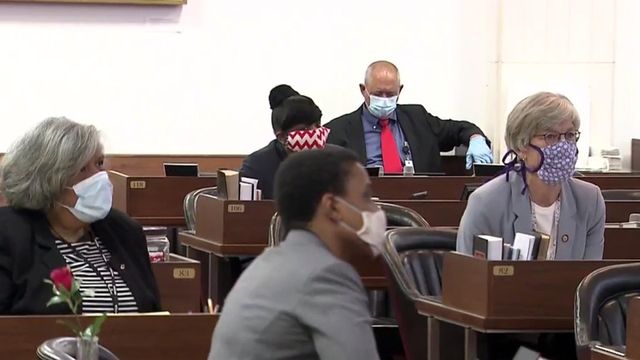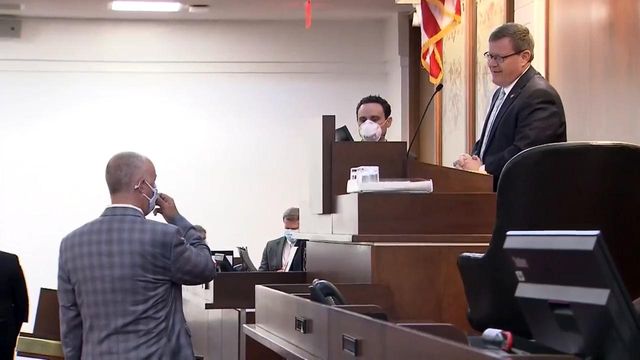NC's COVID-19 legislative session is underway
Lawmakers expect quick resolution, but there are differences to work out in spending and policy bills.
Posted — UpdatedThe House and the Senate will come to terms in the coming days on competing bills to appropriate a couple billion dollars in federal relief aid, sending a consensus bill to the governor perhaps by week's end.
Based on the distance between initial bill drafts, though, and the oddities of this session, the process may extend into next week. Lawmakers on both sides of the aisle, and in both chambers, say they expect broad consensus on a final product.
Moore, Berger on reopen timelines
Protesters outside the legislature called on Cooper to drop the state's stay-at-home orders this week and essentially fully reopen the economy.
But Republican lawmakers leading the House and the Senate took a more reserved approach. House Speaker Tim Moore pointed to Texas, which plans to let stores, restaurants and movie theaters operate at 25 percent capacity come Friday, as a model to watch.
Moore, R-Cleveland, also said he likes a county-by-county approach, something the Cooper administration has resisted, though the governor indicated during a Tuesday afternoon briefing that there might be room for a regional approach as the state moves forward.
"This virus is not as devastating as we thought it could be," he said. "At the same time, we don’t need to just throw the doors open.”
Senate President Pro Tem Phil Berger said he'd like to see quicker phases, instead of moving from one to another in two- to three-week intervals, as Cooper laid out last week.
"A week to 10 days between modifications would make a whole lot more sense," Berger, R-Rockingham, said.
"I just think that what the governor has failed to do, in my view, is exhibit a flexibility as far as his plan is concerned," he said.
Differences between budget proposals
The House has split its proposals into five or so bills, which are expected to come together as soon as Wednesday afternoon.
The Senate bill also doesn't lay out funding for rural hospitals like one of the House bills does. But again, Berger pointed to direct federal funding.
"There are multiple roads of funds that are going to the same places," he said.
The Cooper administration asked for significantly more money for public health and public schools than the Senate bill includes. The administration prefers the House version of the bill.
Both Berger and Moore said the bill that emerges this week likely won't be the state's last on COVID-19, and state leaders say they want to spend federal money first, particularly given expectations of lower state revenues and concerns about the full state budget they'll need to craft in coming months.
The federal government has sent some $3.5 billion down to the state so far, and none of the proposals spend it all. Berger, in particular, talked of passing this bill, then "let's see if there are additional needs."
"The issue is too big," Moore said. "To me, this isn’t a partisan issue. It isn’t an issue of the House versus the governor, the House versus the Senate, none of that junk. This is about taking care of some critical issues facing the state that are unprecedented in any of our lifetimes."
"There’s a lot of need out there, so hopefully we can come to consensus to do what we have to do and need to do and have some other long-term budget battles when we come back in month or two months, or whatever it is," House Minority Leader Darren Jackson said.
The Cooper administration was combing through the Senate bill Tuesday evening but was concerned with the way that chamber deals with personal protective equipment, which would be purchased out of a $50 million bucket. The Senate language limits distribution to hospitals, nursing homes and doctor's offices, leaving out first responders and home health care workers, among others.
State emergency officials have said most of the PPE requests they get do not come from hospitals.
The Senate bill also punts on changes to state election law, specifically noting an intent "to appropriate funds for election security in a subsequent act of the General Assembly."
Berger noted elections aren't until November, with the exception of an 11th Congressional District runoff race in June. Election officials in those western counties have asked for changes to help ease a shortage of poll workers willing to work in precincts, and Berger said Tuesday the General Assembly "can look at that."
The Senate bill deals with the DOT's $300 million, and another $300 million for local governments, differently than the House and the governor have proposed. The Senate bill essentially sets it aside while the federal rules are navigated and potentially changed, requiring a future appropriation decision that the House and Cooper versions would not.
Both chambers plan to extend Division of Motor Vehicles deadlines so people don't have to visit a DMV office during the pandemic.
The Senate proposal also includes:
- $6 million for food banks
- A $100 monthly boost for parents of foster children
- Up to $20 million for animal disposal due to the closure of processing plants and the resulting supply chain disruptions
- $25 million to the community college system to enhance online learning and to prepare for a return of students, including sanitation
- $42.4 million to the state university system for online learning and the costs of returning students to campus
- $10 million for private universities
- $20 million to Wake Forest University to expand its COVID-19 surveillance and antibody testing program, a project Berger and other lawmakers pushed for and seeded earlier this year with $100,000
- $15 million to the Duke University Human Vaccine Institute and Duke University School of Medicine to develop a COVID-19 vaccine
- $15 million to the NC Policy Collaboratory at UNC-Chapel Hill to coordinate and fund COVID-19 research efforts at a range of state medical schools
- $5 million to the state Department of Commerce, including $4.5 million to boost tourism in the coming months while educating people on how to "travel in a safe and socially distant way"
- $70 million for various "continuity of operation" needs across state government, including overtime costs at state prisons
- $56 million for school lunch and breakfast programs
- $9 million for a rural broadband program
- $25 million to expand public and private initiatives for COVID-19 testing, contact tracing and trends
The Senate would also put $125 million into a small-business loan program run through Golden LEAF, a Rocky Mount-based economic development foundation. The House had previously proposed $75 million for the program.
The Senate and House measures are also both loaded with policy changes, including a new start date for the next school year – Aug. 17 – along with various testing and other education policy waivers. School performance grades – the school-by-school report cards that go online – would also be waived for a year.
The Senate's budget calls for reading tests normally given at the end of third grade, and part of reforms Berger shepherded though the legislature several years back, to be given by the 10th day of fourth grade instead.
Related Topics
• Credits
Copyright 2024 by Capitol Broadcasting Company. All rights reserved. This material may not be published, broadcast, rewritten or redistributed.






